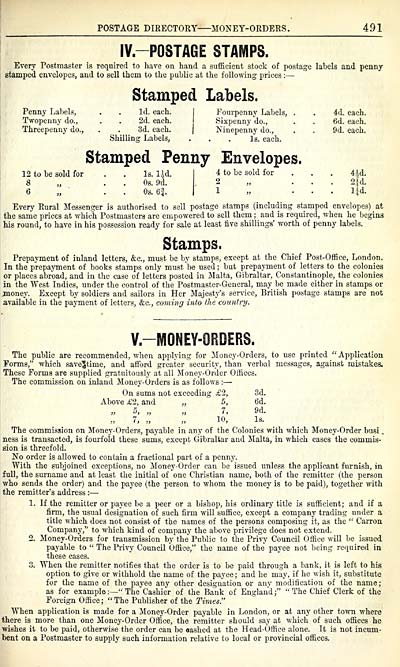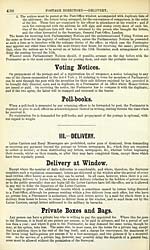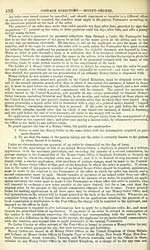Download files
Complete book:
Individual page:
Thumbnail gallery: Grid view | List view

POSTAGE DIRECTORY MONEY-ORDERS. 491
lY-POSTAGE STAMPS.
Every Postmaster is required to have on hand a sufficient stock of postage labels and penny
stamped envelopes, and to sell them to tlie public at the following prices : —
Stamped Labels.
Penny Labels, . . Id. each. I Fourpenny Labels, . . 4d. each.
Twopenny do., . . 2d. each. Sixpenny do., . . 6d. each.
Threepenny do., . . 3d. each. | Ninepenny do., . . 9d. each.
Shilling Labels, . . . Is. each.
Stamped Penny Envelopes.
12 to be sold for . . Is. l^d. I 4 to be sold for . . . UA.
8 „ . . Os. 9-d. 2 „ ... 2.id.
6 „ . . Os. 61. I 1 „ ... l|d.
Every Rural Messenger is authorised to sell postage stamps (including stamped envelopes) at
the same prices at which Postmasters are empowered to sell them ; and is required, when he begins
his round, to have in his possession ready for sale at least five shillings' worth of penny labels.
Stamps.
Prepayment of inland letters, &c., must be by stamps, except at the Chief Post-Office, London.
In the prepayment of books stamps only must be used; but prepayment of letters to the colonies
or places abroad, and in the case of letters posted in Malta, Gibraltar, Constantinople, the colonies
in the West Indies, under the control of the Postmaster-General, may be made either in stamps or
jnonej-. Except by soldiers and sailors in Her Majesty's service, British postage stamps are not
available in the payment of letters, &c., coming into the country.
V.-MOKEY-ORDERS.
The public are recommended, when applying for iloncy-Orders, to use printed " Application
Forms," which save|time, and afford greater security, than verbal messages, against mistakes.
These Forms are supplied gratuitously at all Money-Order Offices.
The commission on inland Money-Orders is as follows : —
On sums not exceeding £2, 3d.
Above £2, and „ 5, 6d.
5, „ „ 7, 9d.
7, „ „ 10, Is.
The commission on Money-Orders, payable in any of the Colonies with which Money-Order busi .
ness is transacted, is fourfold these sums, except Gibraltar and Malta, in which cases the commis-
sion is threefold.
1^0 order is allowed to contain a fractional part of a penny.
With the subjoined exceptions, no Money-Order can be issued unless the applicant furnish, in
full, the surname and at least the initial of one Christian name, both of the remitter (the person
who sends the order) and the payee (the person to whom the money is to be paid), together with
the remitter's address : —
1. If the remitter or payee be a peer or a bishop, his ordinary title is sufficient; and if a
firm, the usual designation of such firm will suffice, except a company trading under a
title which does not consist of the names of the persons composing it, as the " Carron
Company," to which kind of company the above privilege does not extend.
2. Money-Orders for transmission by the Public to the Privy Council Office will be issued
payable to " The Privy Council Office," the name of the payee not being required in
these cases.
3. When the remitter notifies that the order is to be paid through a bank, it is left to his
option to give or withhold the name of the payee; and he may, if he wish it, substitute
for the name of the payee anj' other designation or any modification of the name;
as for example : — " The Cashier of the Bank of England ;" " The Chief Clerk of the
Foreign Office; "The Publisher of the Times."
When application is made for a Money-Order payable in London, or at any other town where
there is more than one Money-Order Office, the remitter should say at which of such offices he
■wishes it to be paid, otherwise the order can be oashed at the Head-Office alone. It is not incum-
bent on a Postmaster to supply such information relative to local or provincial offices.
lY-POSTAGE STAMPS.
Every Postmaster is required to have on hand a sufficient stock of postage labels and penny
stamped envelopes, and to sell them to tlie public at the following prices : —
Stamped Labels.
Penny Labels, . . Id. each. I Fourpenny Labels, . . 4d. each.
Twopenny do., . . 2d. each. Sixpenny do., . . 6d. each.
Threepenny do., . . 3d. each. | Ninepenny do., . . 9d. each.
Shilling Labels, . . . Is. each.
Stamped Penny Envelopes.
12 to be sold for . . Is. l^d. I 4 to be sold for . . . UA.
8 „ . . Os. 9-d. 2 „ ... 2.id.
6 „ . . Os. 61. I 1 „ ... l|d.
Every Rural Messenger is authorised to sell postage stamps (including stamped envelopes) at
the same prices at which Postmasters are empowered to sell them ; and is required, when he begins
his round, to have in his possession ready for sale at least five shillings' worth of penny labels.
Stamps.
Prepayment of inland letters, &c., must be by stamps, except at the Chief Post-Office, London.
In the prepayment of books stamps only must be used; but prepayment of letters to the colonies
or places abroad, and in the case of letters posted in Malta, Gibraltar, Constantinople, the colonies
in the West Indies, under the control of the Postmaster-General, may be made either in stamps or
jnonej-. Except by soldiers and sailors in Her Majesty's service, British postage stamps are not
available in the payment of letters, &c., coming into the country.
V.-MOKEY-ORDERS.
The public are recommended, when applying for iloncy-Orders, to use printed " Application
Forms," which save|time, and afford greater security, than verbal messages, against mistakes.
These Forms are supplied gratuitously at all Money-Order Offices.
The commission on inland Money-Orders is as follows : —
On sums not exceeding £2, 3d.
Above £2, and „ 5, 6d.
5, „ „ 7, 9d.
7, „ „ 10, Is.
The commission on Money-Orders, payable in any of the Colonies with which Money-Order busi .
ness is transacted, is fourfold these sums, except Gibraltar and Malta, in which cases the commis-
sion is threefold.
1^0 order is allowed to contain a fractional part of a penny.
With the subjoined exceptions, no Money-Order can be issued unless the applicant furnish, in
full, the surname and at least the initial of one Christian name, both of the remitter (the person
who sends the order) and the payee (the person to whom the money is to be paid), together with
the remitter's address : —
1. If the remitter or payee be a peer or a bishop, his ordinary title is sufficient; and if a
firm, the usual designation of such firm will suffice, except a company trading under a
title which does not consist of the names of the persons composing it, as the " Carron
Company," to which kind of company the above privilege does not extend.
2. Money-Orders for transmission by the Public to the Privy Council Office will be issued
payable to " The Privy Council Office," the name of the payee not being required in
these cases.
3. When the remitter notifies that the order is to be paid through a bank, it is left to his
option to give or withhold the name of the payee; and he may, if he wish it, substitute
for the name of the payee anj' other designation or any modification of the name;
as for example : — " The Cashier of the Bank of England ;" " The Chief Clerk of the
Foreign Office; "The Publisher of the Times."
When application is made for a Money-Order payable in London, or at any other town where
there is more than one Money-Order Office, the remitter should say at which of such offices he
■wishes it to be paid, otherwise the order can be oashed at the Head-Office alone. It is not incum-
bent on a Postmaster to supply such information relative to local or provincial offices.
Set display mode to: Large image | Transcription
Images and transcriptions on this page, including medium image downloads, may be used under the Creative Commons Attribution 4.0 International Licence unless otherwise stated. ![]()
| Scottish Post Office Directories > Towns > Edinburgh > Post Office Edinburgh and Leith directory > 1863-1864 > (495) |
|---|
| Permanent URL | https://digital.nls.uk/83123765 |
|---|
| Description | Directories of individual Scottish towns and their suburbs. |
|---|
| Description | Around 700 Scottish directories published annually by the Post Office or private publishers between 1773 and 1911. Most of Scotland covered, with a focus on Edinburgh, Glasgow, Dundee and Aberdeen. Most volumes include a general directory (A-Z by surname), street directory (A-Z by street) and trade directory (A-Z by trade). |
|---|


